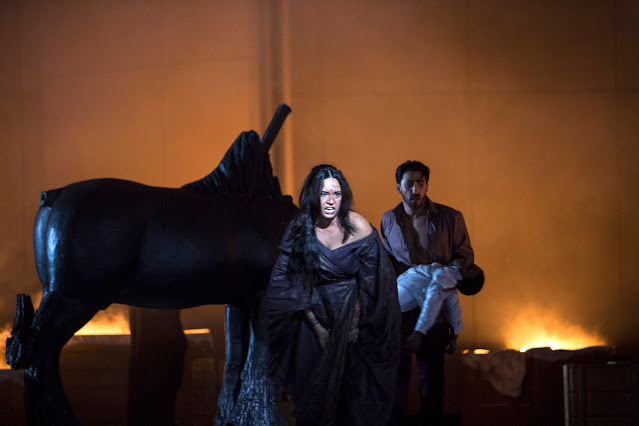Médée – Sonya Yoncheva
Jason – Charles Castronovo
Créon – Peter Schöne
Dircé – Slavá Zámečníková
Néris – Marina Prudenskaya
Dircé’s Handmaidens – Regina Koncz, Maria Hegele
Children of Jason and Médée – Fritz Bachmann, Nathan Kamsu
Martin Zehetgruber (set designs)
Carla Teti (costumes)
Olaf Freese (lighting)
 |
| Images: Bernd Uhlig |
Cherubini’s best-known and surely greatest opera, Médée, continues to hover on the edge of the repertory. It had a high-profile outing in Salzburg in 2019, about which production if not performance the less said the better. The previous year, Andrea Breth’s staging came to the Staatsoper Unter den Linden. I missed it then, but caught (just) its first revival in February 2020, shortly before theatres closed for longer than any of us ever imagined. Now it receives its second revival and will feature next season too. I caught it just in time, making not only the final performance of this run but of the Staatsoper’s season. It made for an excellent finish, quite the way to go out, and acclaimed as such by an enthusiastic audience.
Médée continues, in various ways, to seem a strange work, though it
may be our categories and reference points that are at fault there rather than
the opera itself. Some of its arias seem long for their role, as if
transplanted from a pre-Mozartian seria world that yet cannot evade the
Salzburger’s influence (and why should anyone wish to?) At the same time, the
influence of reformist Gluck – and, I think, Niccolò Jommelli – is felt
strongly, accompagnati and increasingly dramatic orchestral writing
included. If one can tell, or at least speculate, why Cherubini and Beethoven
would have held such mutual respect, it is Berlioz who, perhaps surprisingly, comes
to seem closer as the work proceeds. Breth and Sergio Morabito have drastically
shortened the dialogue. One can understand why, especially with a non-Francophone
cast – Charles Castronovo fared notably better in spoken French than the rest –
but, as with Fidelio, to which in some respects it stands quite close,
that has mixed implications for its proportions and dramatic flow. At least it
is treated (more or less) properly as an opéra-comique – which does not
in any sense imply comedy! – rather than receiving the Italian treatment
popularised by Maria Callas.
The production, very much a collaborative effort, designs and lighting making powerful contributions, presents a closed or at least inaccessible world, with more than a little of the underground to it, perhaps even a bunkered existence for Créon’s regime. Médée, clearly not of that world and thereby assuming powers against as well as enmity from it, gains access and must be banished. The people are largely external to these quarters, though they are shown what Créon wishes them to see—and prevented from seeing what he does not wish them to see. I do not want to go on again about the decision to adopt ‘exotic’ skin colouring for Médée. It seems to me at best unnecessary; there are – and were – other ways to connote ‘otherness’. But if one can live with it, the production largely permits the work to play out and introduce us to its particular qualities. There is a fine Götterdämmerung-in-miniature quality to its final act.
In the wake of Callas, the opera has often been treated as a ‘vehicle’. Again, one can understand why, but it is far more than that, and deserves better. That is not to say that Sonya Yoncheva’s performance lacked star quality, quite the contrary: it was sensational. But it was dramatically grounded, just as it might be in, say, Gluck’s Iphigénie en Tauride (which, now I think about it, would be just the piece for her). Yoncheva sang, but also she spat; she wept, but also she exulted. I find it difficult to believe the role can ever have been more mesmerizingly played. Drama arose from the score, out of the extraordinary range of colours and modes of delivery she conjured, whilst she maintained tight yet generous focus on trajectory. In that, she perfectly complemented Oksana Lyniv’s conducting, which I admired in 2020 but which now seemed to acquire greater tragic depth and breadth as the evening progressed, without the slightest loss to precision and clarity, for which of course the Staatskapelle Berlin must share credit.
 |
| Médée, Jason (Charles Castronovo) |
Castronovo, who sang at the premiere but not at the first revival, was equally impressive—or would have been, had the role permitted. In what may be the finest performance I have seen and heard from him, he fully inhabited Jason’s slithery character and world, treading a tightrope between undeniable allure and the contempt we should feel. In a microcosm, we experienced this on his first appearance: having struck a bargain with Créon, he managed also to have his desultory way with one of Dircé handmaidens, witnessed by Dircé herself (as was his first confrontation with Medée). Slavá Zámečníková thus evoked our sympathy as Dircé, cleanness of line in her first aria approaching a metaphor for an innocence shared by none around her. Wherever fault may lie, it is not with her. Marina Prudenskaya gave a typically excellent performance, alert and considered, as Médée’s slave, Néris. Peter Schöne was properly unsympathetic as Créon, here notably in Médée’s thrall too. The chorus was also on fine form indeed, a crucial contributor to as well as observer of the unfurling tragedy.
There will be other opportunities over the
coming years to experience Cherubini’s opera, though perhaps not many. This,
when it returns in the autumn, demands and will reward anyone’s attention.

